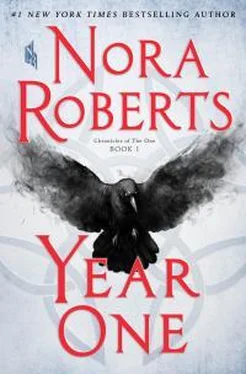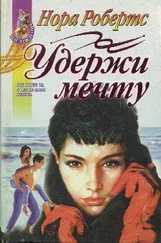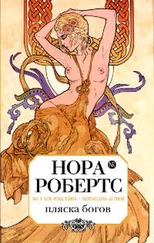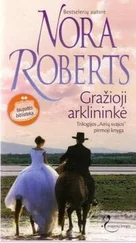They’d renamed the town and replaced the signs at the town borders. And New Hope became home.
Though there were days she woke physically aching for the life she’d known, she remembered the fear, the horror of the tunnel, the bitter cold. And the bodies found along the way, the bodies found in houses in the place they’d claimed as theirs.
So she wrote her bulletins on the old Underwood on an antique desk with the photo of her with her family at Christmas framed and facing her.
In today’s news she’d announce that Drake Manning, electrician, and Wanda Swartz, engineer, continued their work to provide electric power for the community. As her own reporter, editor-in-chief, and publisher, she debated whether or not to include the statements from their newest community members that Washington, D.C., was essentially a war zone between military authority, organized Raiders, and factions of the Uncanny.
She weighed the public’s (such as it was) right to know against human panic. Then added reality. Gossip spread like butter over hot toast through the community. Better to write up the statements.
She added some local color: mentioned the progress on the community garden—Fred’s baby—in the town’s pretty, sprawling park; announced Story Time for kids of all ages; reminded readers to bring found books that they didn’t want to the town library (formerly First Virginia Bank).
She posted announcements for volunteer sign-up lists—gardening, the food bank, the supply center, the clothing exchange, sentry duty, supply runs, animal husbandry.
Taking her two-page bulletin, Arlys walked out into the living room. While the furnishings struck her—and likely always would—as Early American Tedium, all that faded with Fred’s touch.
A half dozen little vases held spring flowers, stones rubbed smooth by the nearby creek filled shallow bowls, bits of colorful fabric, ribbons, buttons arranged in a frame created fanciful art. In the scrubbed-out hearth, an arrangement of candles added a welcoming touch, and light in the dark.
Gone were the ugly old drapes from the two front windows. In their place, Fred hung strings of colorful beads that caught the sunlight in rainbows.
She sought to inform, Arlys thought, Fred instinctively brightened. She wondered which one of them truly provided the best service.
She stepped onto the porch. Fred had pressured her into helping paint two old metal chairs a sweet and silly pink. On the table between them sat a white pot holding a single white geranium.
Around the doorframe Fred had painted her magick symbols.
A pair of pink flamingos guarded one side of the porch steps, a family of garden gnomes the other. Wind chimes tinkled in the spring breeze.
Arlys thought of it as Fred’s Faerie House, and found herself surprisingly content there.
People walked along the street or rode bikes. She knew the faces, most of the names, could point out their community skills or flaws. She spotted Bill Anderson up and across the street, washing the display window of Bygones. He’d taken over the shop, organized it. People took what they needed, and most bartered their time, their skills in exchange.
There would come a time—she and what she thought of as the core group had talked about it often—when they would need a more defined structure, rules, even laws—and laws meant punishments.
Some would have to be in charge—and there were one or two already pushing to take control.
She walked across the street to the single-story schoolhouse. Katie sat at a table out front nursing one of the babies while another slept in a PortaBed, and the third cooed in a baby swing.
What Arlys knew about babies, she’d learned almost entirely in the previous weeks, but she knew when she looked at a trio of happy, healthy, and seriously pretty ones.
“I swear they’re bigger every time I see them.”
“Good appetites, all three of them.” Katie lifted her face to the sky. “It’s too pretty a day to be inside, so I set up out here.” She adjusted a paperweight on one of her sign-up sheets as the breeze fluttered. “The fresh air’s good for all of us. I just saw Fred.”
It was a pretty day, Arlys thought, and took advantage of it by sitting down next to Katie. “I thought she was down at the gardens.”
“She came by for her baby fix. New Bulletin ?”
“Yeah, hot off the idiot typewriter. If Chuck ever performs his IT miracle I’ll kiss him on the mouth. Hell, I’ll offer the sexual favor of his choice.”
“I’m starting to miss sex.” Katie sighed. “Is that disloyal? I loved Tony so much, I—”
“It’s not. It’s human.”
“Maybe it’s because I’m starting to feel settled, the last couple of weeks especially. I don’t wake up every night in the dark scared. It feels … settled to wake up in the same place every day, to have purpose every day. I know I don’t do as much as the rest, but—”
“That’s not true. You’re feeding and raising three babies.”
“I have help. Everyone helps.”
“ Three babies,” Arlys repeated. “You’re running our census and the sign-ups. I realized today, I don’t know everyone’s name anymore. Faces, yes, but not names. You would. I’ve seen you charm people into signing up or heading a task, an activity. You’re good with people. A natural community organizer.”
“It’s hard to say no or to bitch at a nursing mother. Speaking of charming people, we could use another sign-up for morning yoga. It’s good for stress, and you have too much stress. Don’t say you don’t have time. We all do.”
“That woman’s weird, Katie.”
“What’s weird about a fifty-year-old faerie calling herself Rainbow?” Katie smiled. “Besides, she’s a good instructor. I took a couple of classes myself, and can vouch she’s patient and knowledgeable. Try one, okay? Just try one. If you hate it, I’ll never bug you again.”
“Fine, fine. Did I say charming? Nagging ’s more accurate.” But Arlys scrawled her name on the sheet. “How many faeries does that make now?”
Katie reached down into her diaper bag, pulled out a notebook. She flipped through the tabs to her list. “Eight, but that doesn’t count the little ones who come and go. I saw some last night—middle of the night—when Duncan was restless. Just lights dancing around the backyard. And, Arlys, this morning, there are flowers blooming along the fence line that weren’t there yesterday. I have to ask Fred what they are, but it’s … Maybe another reason I’m not scared all the time.”
With a smooth, maternal grace, she shifted the baby—Duncan, Arlys realized—from breast to shoulder. “Anyway, eight faeries. At least eight comfortable enough to claim it. Four elves. I’m not sure what the difference is there. Twelve that fall into the witch/wizard/sorcerer group. And we’ve got twenty-eight who list some sort of ability. Like Jonah. I’ve got five with prophetic dreams, two shapeshifters—verified, and you can bet that’s a jolt to watch. We’ve got four with telekinesis, an alchemist, two seers, and so on.”
So many, Arlys realized. She hadn’t been keeping up.
“Looking at the math, that’s more than twenty percent of the community with magickal abilities.”
“I think there are even more. I think there are some who aren’t saying, who’re afraid to.” On Katie’s shoulder, Duncan let out a small, distinct burp. “We’ve also got a percentage—small, but it’s there—who are, well, magick bigots.”
“Kurt Rove.”
“He’d be president of the anti-magick coalition. I’m glad he’s taken over working at the feedstore so he’s not in town all that much.”
“Even there, he’s a pain in the ass from what I hear.”
Читать дальше












